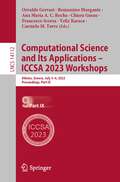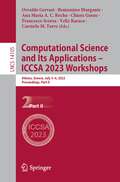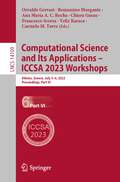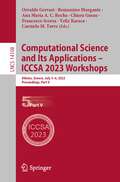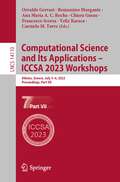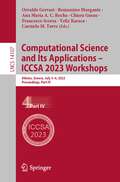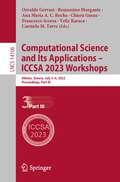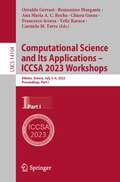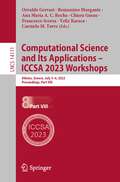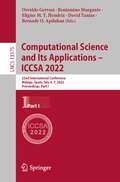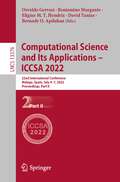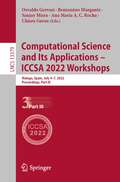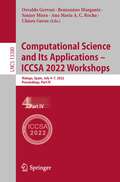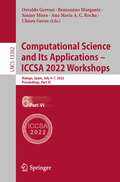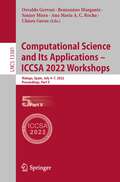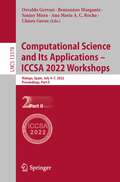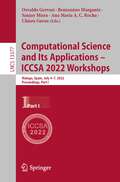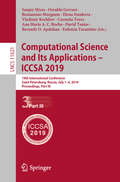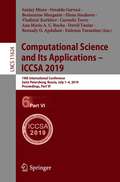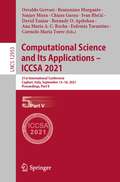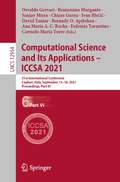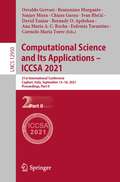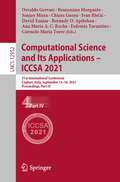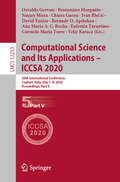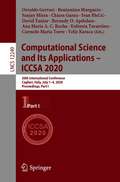- Table View
- List View
Computational Science and Its Applications – ICCSA 2023 Workshops: Athens, Greece, July 3–6, 2023, Proceedings, Part IX (Lecture Notes in Computer Science #14112)
by Osvaldo Gervasi Beniamino Murgante Ana Maria A. C. Rocha Chiara Garau Francesco Scorza Yeliz Karaca Carmelo M. TorreThis nine-volume set LNCS 14104 – 14112 constitutes the refereed workshop proceedings of the 23rd International Conference on Computational Science and Its Applications, ICCSA 2023, held at Athens, Greece, during July 3–6, 2023.The 350 full papers and 29 short papers and 2 PHD showcase papers included in this volume were carefully reviewed and selected from a total of 876 submissions. These nine-volumes includes the proceedings of the following workshops: Advances in Artificial Intelligence Learning Technologies: Blended Learning, STEM, Computational Thinking and Coding (AAILT 2023); Advanced Processes of Mathematics and Computing Models in Complex Computational Systems (ACMC 2023); Artificial Intelligence supported Medical data examination (AIM 2023); Advanced and Innovative web Apps (AIWA 2023); Assessing Urban Sustainability (ASUS 2023); Advanced Data Science Techniques with applications in Industry and Environmental Sustainability (ATELIERS 2023); Advances in Web Based Learning (AWBL 2023); Blockchain and Distributed Ledgers: Technologies and Applications (BDLTA 2023); Bio and Neuro inspired Computing and Applications (BIONCA 2023); Choices and Actions for Human Scale Cities: Decision Support Systems (CAHSC-DSS 2023); and Computational and Applied Mathematics (CAM 2023).
Computational Science and Its Applications – ICCSA 2023 Workshops: Athens, Greece, July 3–6, 2023, Proceedings, Part II (Lecture Notes in Computer Science #14105)
by Osvaldo Gervasi Beniamino Murgante Ana Maria A. C. Rocha Chiara Garau Francesco Scorza Yeliz Karaca Carmelo M. TorreThis nine-volume set LNCS 14104 – 14112 constitutes the refereed workshop proceedings of the 23rd International Conference on Computational Science and Its Applications, ICCSA 2023, held at Athens, Greece, during July 3–6, 2023. The 350 full papers and 29 short papers and 2 PHD showcase papers included in this volume were carefully reviewed and selected from a total of 876 submissions. These nine-volumes includes the proceedings of the following workshops: Advances in Artificial Intelligence Learning Technologies: Blended Learning, STEM, Computational Thinking and Coding (AAILT 2023); Advanced Processes of Mathematics and Computing Models in Complex Computational Systems (ACMC 2023); Artificial Intelligence supported Medical data examination (AIM 2023); Advanced and Innovative web Apps (AIWA 2023); Assessing Urban Sustainability (ASUS 2023); Advanced Data Science Techniques with applications in Industry and Environmental Sustainability (ATELIERS 2023); Advances in Web Based Learning (AWBL 2023); Blockchain and Distributed Ledgers: Technologies and Applications (BDLTA 2023); Bio and Neuro inspired Computing and Applications (BIONCA 2023); Choices and Actions for Human Scale Cities: Decision Support Systems (CAHSC-DSS 2023); and Computational and Applied Mathematics (CAM 2023).
Computational Science and Its Applications – ICCSA 2023 Workshops: Athens, Greece, July 3–6, 2023, Proceedings, Part VI (Lecture Notes in Computer Science #14109)
by Osvaldo Gervasi Beniamino Murgante Ana Maria A. C. Rocha Chiara Garau Francesco Scorza Yeliz Karaca Carmelo M. TorreThis nine-volume set LNCS 14104 – 14112 constitutes the refereed workshop proceedings of the 23rd International Conference on Computational Science and Its Applications, ICCSA 2023, held at Athens, Greece, during July 3–6, 2023. The 350 full papers and 29 short papers and 2 PHD showcase papers included in this volume were carefully reviewed and selected from a total of 876 submissions. These nine-volumes includes the proceedings of the following workshops: Advances in Artificial Intelligence Learning Technologies: Blended Learning, STEM, Computational Thinking and Coding (AAILT 2023); Advanced Processes of Mathematics and Computing Models in Complex Computational Systems (ACMC 2023); Artificial Intelligence supported Medical data examination (AIM 2023); Advanced and Innovative web Apps (AIWA 2023); Assessing Urban Sustainability (ASUS 2023); Advanced Data Science Techniques with applications in Industry and Environmental Sustainability (ATELIERS 2023); Advances in Web Based Learning (AWBL 2023); Blockchain and Distributed Ledgers: Technologies and Applications (BDLTA 2023); Bio and Neuro inspired Computing and Applications (BIONCA 2023); Choices and Actions for Human Scale Cities: Decision Support Systems (CAHSC-DSS 2023); and Computational and Applied Mathematics (CAM 2023).
Computational Science and Its Applications – ICCSA 2023 Workshops: Athens, Greece, July 3–6, 2023, Proceedings, Part V (Lecture Notes in Computer Science #14108)
by Osvaldo Gervasi Beniamino Murgante Ana Maria A. C. Rocha Chiara Garau Francesco Scorza Yeliz Karaca Carmelo M. TorreThis nine-volume set LNCS 14104 – 14112 constitutes the refereed workshop proceedings of the 23rd International Conference on Computational Science and Its Applications, ICCSA 2023, held at Athens, Greece, during July 3–6, 2023. The 350 full papers and 29 short papers and 2 PHD showcase papers included in this volume were carefully reviewed and selected from a total of 876 submissions. These nine-volumes includes the proceedings of the following workshops: Advances in Artificial Intelligence Learning Technologies: Blended Learning, STEM, Computational Thinking and Coding (AAILT 2023); Advanced Processes of Mathematics and Computing Models in Complex Computational Systems (ACMC 2023); Artificial Intelligence supported Medical data examination (AIM 2023); Advanced and Innovative web Apps (AIWA 2023); Assessing Urban Sustainability (ASUS 2023); Advanced Data Science Techniques with applications in Industry and Environmental Sustainability (ATELIERS 2023); Advances in Web Based Learning (AWBL 2023); Blockchain and Distributed Ledgers: Technologies and Applications (BDLTA 2023); Bio and Neuro inspired Computing and Applications (BIONCA 2023); Choices and Actions for Human Scale Cities: Decision Support Systems (CAHSC-DSS 2023); and Computational and Applied Mathematics (CAM 2023).
Computational Science and Its Applications – ICCSA 2023 Workshops: Athens, Greece, July 3–6, 2023, Proceedings, Part VII (Lecture Notes in Computer Science #14110)
by Osvaldo Gervasi Beniamino Murgante Ana Maria A. C. Rocha Chiara Garau Francesco Scorza Yeliz Karaca Carmelo M. TorreThis nine-volume set LNCS 14104 – 14112 constitutes the refereed workshop proceedings of the 23rd International Conference on Computational Science and Its Applications, ICCSA 2023, held at Athens, Greece, during July 3–6, 2023.The 350 full papers and 29 short papers and 2 PHD showcase papers included in this volume were carefully reviewed and selected from a total of 876 submissions. These nine-volumes includes the proceedings of the following workshops: Advances in Artificial Intelligence Learning Technologies: Blended Learning, STEM, Computational Thinking and Coding (AAILT 2023); Advanced Processes of Mathematics and Computing Models in Complex Computational Systems (ACMC 2023); Artificial Intelligence supported Medical data examination (AIM 2023); Advanced and Innovative web Apps (AIWA 2023); Assessing Urban Sustainability (ASUS 2023); Advanced Data Science Techniques with applications in Industry and Environmental Sustainability (ATELIERS 2023); Advances in Web Based Learning (AWBL 2023); Blockchain and Distributed Ledgers: Technologies and Applications (BDLTA 2023); Bio and Neuro inspired Computing and Applications (BIONCA 2023); Choices and Actions for Human Scale Cities: Decision Support Systems (CAHSC-DSS 2023); and Computational and Applied Mathematics (CAM 2023).
Computational Science and Its Applications – ICCSA 2023 Workshops: Athens, Greece, July 3–6, 2023, Proceedings, Part IV (Lecture Notes in Computer Science #14107)
by Osvaldo Gervasi Beniamino Murgante Ana Maria A. C. Rocha Chiara Garau Francesco Scorza Yeliz Karaca Carmelo M. TorreThis nine-volume set LNCS 14104 – 14112 constitutes the refereed workshop proceedings of the 23rd International Conference on Computational Science and Its Applications, ICCSA 2023, held at Athens, Greece, during July 3–6, 2023.The 350 full papers and 29 short papers and 2 PHD showcase papers included in this volume were carefully reviewed and selected from a total of 876 submissions. These nine-volumes includes the proceedings of the following workshops: Advances in Artificial Intelligence Learning Technologies: Blended Learning, STEM, Computational Thinking and Coding (AAILT 2023); Advanced Processes of Mathematics and Computing Models in Complex Computational Systems (ACMC 2023); Artificial Intelligence supported Medical data examination (AIM 2023); Advanced and Innovative web Apps (AIWA 2023); Assessing Urban Sustainability (ASUS 2023); Advanced Data Science Techniques with applications in Industry and Environmental Sustainability (ATELIERS 2023); Advances in Web Based Learning (AWBL 2023); Blockchain and Distributed Ledgers: Technologies and Applications (BDLTA 2023); Bio and Neuro inspired Computing and Applications (BIONCA 2023); Choices and Actions for Human Scale Cities: Decision Support Systems (CAHSC-DSS 2023); and Computational and Applied Mathematics (CAM 2023).
Computational Science and Its Applications – ICCSA 2023 Workshops: Athens, Greece, July 3–6, 2023, Proceedings, Part III (Lecture Notes in Computer Science #14106)
by Osvaldo Gervasi Beniamino Murgante Ana Maria A. C. Rocha Chiara Garau Francesco Scorza Yeliz Karaca Carmelo M. TorreThis nine-volume set LNCS 14104 – 14112 constitutes the refereed workshop proceedings of the 23rd International Conference on Computational Science and Its Applications, ICCSA 2023, held at Athens, Greece, during July 3–6, 2023. The 350 full papers and 29 short papers and 2 PHD showcase papers included in this volume were carefully reviewed and selected from a total of 876 submissions. These nine-volumes includes the proceedings of the following workshops: Advances in Artificial Intelligence Learning Technologies: Blended Learning, STEM, Computational Thinking and Coding (AAILT 2023); Advanced Processes of Mathematics and Computing Models in Complex Computational Systems (ACMC 2023); Artificial Intelligence supported Medical data examination (AIM 2023); Advanced and Innovative web Apps (AIWA 2023); Assessing Urban Sustainability (ASUS 2023); Advanced Data Science Techniques with applications in Industry and Environmental Sustainability (ATELIERS 2023); Advances in Web Based Learning (AWBL 2023); Blockchain and Distributed Ledgers: Technologies and Applications (BDLTA 2023); Bio and Neuro inspired Computing and Applications (BIONCA 2023); Choices and Actions for Human Scale Cities: Decision Support Systems (CAHSC-DSS 2023); and Computational and Applied Mathematics (CAM 2023).
Computational Science and Its Applications – ICCSA 2023 Workshops: Athens, Greece, July 3–6, 2023, Proceedings, Part I (Lecture Notes in Computer Science #14104)
by Osvaldo Gervasi Beniamino Murgante Ana Maria A. C. Rocha Chiara Garau Francesco Scorza Yeliz Karaca Carmelo M. TorreThis nine-volume set LNCS 14104 – 14112 constitutes the refereed workshop proceedings of the 23rd International Conference on Computational Science and Its Applications, ICCSA 2023, held at Athens, Greece, during July 3–6, 2023.The 350 full papers and 29 short papers and 2 PHD showcase papers included in this volume were carefully reviewed and selected from a total of 876 submissions. These nine-volumes includes the proceedings of the following workshops: Advances in Artificial Intelligence Learning Technologies: Blended Learning, STEM, Computational Thinking and Coding (AAILT 2023); Advanced Processes of Mathematics and Computing Models in Complex Computational Systems (ACMC 2023); Artificial Intelligence supported Medical data examination (AIM 2023); Advanced and Innovative web Apps (AIWA 2023); Assessing Urban Sustainability (ASUS 2023); Advanced Data Science Techniques with applications in Industry and Environmental Sustainability (ATELIERS 2023); Advances in Web Based Learning (AWBL 2023); Blockchain and Distributed Ledgers: Technologies and Applications (BDLTA 2023); Bio and Neuro inspired Computing and Applications (BIONCA 2023); Choices and Actions for Human Scale Cities: Decision Support Systems (CAHSC-DSS 2023); and Computational and Applied Mathematics (CAM 2023).
Computational Science and Its Applications – ICCSA 2023 Workshops: Athens, Greece, July 3–6, 2023, Proceedings, Part VIII (Lecture Notes in Computer Science #14111)
by Osvaldo Gervasi Beniamino Murgante Ana Maria A. C. Rocha Chiara Garau Francesco Scorza Yeliz Karaca Carmelo M. TorreThis nine-volume set LNCS 14104 – 14112 constitutes the refereed workshop proceedings of the 23rd International Conference on Computational Science and Its Applications, ICCSA 2023, held at Athens, Greece, during July 3–6, 2023. The 350 full papers and 29 short papers and 2 PHD showcase papers included in this volume were carefully reviewed and selected from a total of 876 submissions. These nine-volumes includes the proceedings of the following workshops: Advances in Artificial Intelligence Learning Technologies: Blended Learning, STEM, Computational Thinking and Coding (AAILT 2023); Advanced Processes of Mathematics and Computing Models in Complex Computational Systems (ACMC 2023); Artificial Intelligence supported Medical data examination (AIM 2023); Advanced and Innovative web Apps (AIWA 2023); Assessing Urban Sustainability (ASUS 2023); Advanced Data Science Techniques with applications in Industry and Environmental Sustainability (ATELIERS 2023); Advances in Web Based Learning (AWBL 2023); Blockchain and Distributed Ledgers: Technologies and Applications (BDLTA 2023); Bio and Neuro inspired Computing and Applications (BIONCA 2023); Choices and Actions for Human Scale Cities: Decision Support Systems (CAHSC-DSS 2023); and Computational and Applied Mathematics (CAM 2023).
Computational Science and Its Applications – ICCSA 2022: 22nd International Conference, Malaga, Spain, July 4–7, 2022, Proceedings, Part I (Lecture Notes in Computer Science #13375)
by Osvaldo Gervasi Beniamino Murgante Eligius M. T. Hendrix David Taniar Bernady O. ApduhanThe eight-volume set LNCS 13375 – 13382 constitutes the proceedings of the 22nd International Conference on Computational Science and Its Applications, ICCSA 2022, which was held in Malaga, Spain during July 4 – 7, 2022. The first two volumes contain the proceedings from ICCSA 2022, which are the 57 full and 24 short papers presented in these books were carefully reviewed and selected from 279 submissions. The other six volumes present the workshop proceedings, containing 285 papers out of 815 submissions. These six volumes includes the proceedings of the following workshops:Advances in Artificial Intelligence Learning Technologies: Blended Learning, STEM, Computational Thinking and Coding (AAILT 2022); Workshop on Advancements in Applied Machine-learning and Data Analytics (AAMDA 2022); Advances in information Systems and Technologies for Emergency management, risk assessment and mitigation based on the Resilience (ASTER 2022); Advances in Web Based Learning (AWBL 2022); Blockchain and Distributed Ledgers: Technologies and Applications (BDLTA 2022); Bio and Neuro inspired Computing and Applications (BIONCA 2022); Configurational Analysis For Cities (CA Cities 2022); Computational and Applied Mathematics (CAM 2022), Computational and Applied Statistics (CAS 2022); Computational Mathematics, Statistics and Information Management (CMSIM); Computational Optimization and Applications (COA 2022); Computational Astrochemistry (CompAstro 2022); Computational methods for porous geomaterials (CompPor 2022); Computational Approaches for Smart, Conscious Cities (CASCC 2022); Cities, Technologies and Planning (CTP 2022); Digital Sustainability and Circular Economy (DiSCE 2022); Econometrics and Multidimensional Evaluation in Urban Environment (EMEUE 2022); Ethical AI applications for a human-centered cyber society (EthicAI 2022); Future Computing System Technologies and Applications (FiSTA 2022); Geographical Computing and Remote Sensing for Archaeology (GCRSArcheo 2022); Geodesign in Decision Making: meta planning and collaborative design for sustainable and inclusive development (GDM 2022); Geomatics in Agriculture and Forestry: new advances and perspectives (GeoForAgr 2022); Geographical Analysis, Urban Modeling, Spatial Statistics (Geog-An-Mod 2022); Geomatics for Resource Monitoring and Management (GRMM 2022); International Workshop on Information and Knowledge in the Internet of Things (IKIT 2022); 13th International Symposium on Software Quality (ISSQ 2022); Land Use monitoring for Sustanability (LUMS 2022); Machine Learning for Space and Earth Observation Data (MALSEOD 2022); Building multi-dimensional models for assessing complex environmental systems (MES 2022); MOdels and indicators for assessing and measuring the urban settlement deVElopment in the view of ZERO net land take by 2050 (MOVEto0 2022); Modelling Post-Covid cities (MPCC 2022); Ecosystem Services: nature’s contribution to people in practice. Assessment frameworks, models, mapping, and implications (NC2P 2022); New Mobility Choices For Sustainable and Alternative Scenarios (NEMOB 2022); 2nd Workshop on Privacy in the Cloud/Edge/IoT World (PCEIoT 2022); Psycho-Social Analysis of Sustainable Mobility in The Pre- and Post-Pandemic Phase (PSYCHE 2022); Processes, methods and tools towards RESilient cities and cultural heritage prone to SOD and ROD disasters (RES 2022); Scientific Computing Infrastructure (SCI 2022); Socio-Economic and Environmental Models for Land Use Management (SEMLUM 2022); 14th International Symposium on Software Engineering Processes and Applications (SEPA 2022); Ports of the future - smartness and sustainability (SmartPorts 2022); Smart Tourism (SmartTourism 2022); Sustainability Performance Assessment: models, approaches and applications toward interdisciplinary and integrated solutions (SPA 2022); Specifics of smart cities development in Europe (SPEED 2022); Smart and Sustainable Island Communities (SSIC 2022); Theoretical and Computational Chemistryand its Applications (TCCMA 2022); Transport Infr
Computational Science and Its Applications – ICCSA 2022: 22nd International Conference, Malaga, Spain, July 4–7, 2022, Proceedings, Part II (Lecture Notes in Computer Science #13376)
by Osvaldo Gervasi Beniamino Murgante Eligius M. T. Hendrix David Taniar Bernady O. ApduhanThe eight-volume set LNCS 13375 – 13382 constitutes the proceedings of the 22nd International Conference on Computational Science and Its Applications, ICCSA 2022, which was held in Malaga, Spain during July 4 – 7, 2022. The first two volumes contain the proceedings from ICCSA 2022, which are the 57 full and 24 short papers presented in these books were carefully reviewed and selected from 279 submissions. The other six volumes present the workshop proceedings, containing 285 papers out of 815 submissions. These six volumes includes the proceedings of the following workshops:Advances in Artificial Intelligence Learning Technologies: Blended Learning, STEM, Computational Thinking and Coding (AAILT 2022); Workshop on Advancements in Applied Machine-learning and Data Analytics (AAMDA 2022); Advances in information Systems and Technologies for Emergency management, risk assessment and mitigation based on the Resilience (ASTER 2022); Advances in Web Based Learning (AWBL 2022); Blockchain and Distributed Ledgers: Technologies and Applications (BDLTA 2022); Bio and Neuro inspired Computing and Applications (BIONCA 2022); Configurational Analysis For Cities (CA Cities 2022); Computational and Applied Mathematics (CAM 2022), Computational and Applied Statistics (CAS 2022); Computational Mathematics, Statistics and Information Management (CMSIM); Computational Optimization and Applications (COA 2022); Computational Astrochemistry (CompAstro 2022); Computational methods for porous geomaterials (CompPor 2022); Computational Approaches for Smart, Conscious Cities (CASCC 2022); Cities, Technologies and Planning (CTP 2022); Digital Sustainability and Circular Economy (DiSCE 2022); Econometrics and Multidimensional Evaluation in Urban Environment (EMEUE 2022); Ethical AI applications for a human-centered cyber society (EthicAI 2022); Future Computing System Technologies and Applications (FiSTA 2022); Geographical Computing and Remote Sensing for Archaeology (GCRSArcheo 2022); Geodesign in Decision Making: meta planning and collaborative design for sustainable and inclusive development (GDM 2022); Geomatics in Agriculture and Forestry: new advances and perspectives (GeoForAgr 2022); Geographical Analysis, Urban Modeling, Spatial Statistics (Geog-An-Mod 2022); Geomatics for Resource Monitoring and Management (GRMM 2022); International Workshop on Information and Knowledge in the Internet of Things (IKIT 2022); 13th International Symposium on Software Quality (ISSQ 2022); Land Use monitoring for Sustanability (LUMS 2022); Machine Learning for Space and Earth Observation Data (MALSEOD 2022); Building multi-dimensional models for assessing complex environmental systems (MES 2022); MOdels and indicators for assessing and measuring the urban settlement deVElopment in the view of ZERO net land take by 2050 (MOVEto0 2022); Modelling Post-Covid cities (MPCC 2022); Ecosystem Services: nature’s contribution to people in practice. Assessment frameworks, models, mapping, and implications (NC2P 2022); New Mobility Choices For Sustainable and Alternative Scenarios (NEMOB 2022); 2nd Workshop on Privacy in the Cloud/Edge/IoT World (PCEIoT 2022); Psycho-Social Analysis of Sustainable Mobility in The Pre- and Post-Pandemic Phase (PSYCHE 2022); Processes, methods and tools towards RESilient cities and cultural heritage prone to SOD and ROD disasters (RES 2022); Scientific Computing Infrastructure (SCI 2022); Socio-Economic and Environmental Models for Land Use Management (SEMLUM 2022); 14th International Symposium on Software Engineering Processes and Applications (SEPA 2022); Ports of the future - smartness and sustainability (SmartPorts 2022); Smart Tourism (SmartTourism 2022); Sustainability Performance Assessment: models, approaches and applications toward interdisciplinary and integrated solutions (SPA 2022); Specifics of smart cities development in Europe (SPEED 2022); Smart and Sustainable Island Communities (SSIC 2022); Theoretical and Computational Chemistryand its Applications (TCCMA 2022); Transport Infr
Computational Science and Its Applications – ICCSA 2022 Workshops: Malaga, Spain, July 4–7, 2022, Proceedings, Part III (Lecture Notes in Computer Science #13379)
by Osvaldo Gervasi Beniamino Murgante Sanjay Misra Ana Maria A. C. Rocha Chiara GarauThe eight-volume set LNCS 13375 – 13382 constitutes the proceedings of the 22nd International Conference on Computational Science and Its Applications, ICCSA 2022, which was held in Malaga, Spain during July 4 – 7, 2022. The first two volumes contain the proceedings from ICCSA 2022, which are the 57 full and 24 short papers presented in these books were carefully reviewed and selected from 279 submissions. The other six volumes present the workshop proceedings, containing 285 papers out of 815 submissions. These six volumes includes the proceedings of the following workshops: Advances in Artificial Intelligence Learning Technologies: Blended Learning, STEM, Computational Thinking and Coding (AAILT 2022); Workshop on Advancements in Applied Machine-learning and Data Analytics (AAMDA 2022); Advances in information Systems and Technologies for Emergency management, risk assessment and mitigation based on the Resilience (ASTER 2022); Advances in Web Based Learning (AWBL 2022); Blockchain and Distributed Ledgers: Technologies and Applications (BDLTA 2022); Bio and Neuro inspired Computing and Applications (BIONCA 2022); Configurational Analysis For Cities (CA Cities 2022); Computational and Applied Mathematics (CAM 2022), Computational and Applied Statistics (CAS 2022); Computational Mathematics, Statistics and Information Management (CMSIM); Computational Optimization and Applications (COA 2022); Computational Astrochemistry (CompAstro 2022); Computational methods for porous geomaterials (CompPor 2022); Computational Approaches for Smart, Conscious Cities (CASCC 2022); Cities, Technologies and Planning (CTP 2022); Digital Sustainability and Circular Economy (DiSCE 2022); Econometrics and Multidimensional Evaluation in Urban Environment (EMEUE 2022); Ethical AI applications for a human-centered cyber society (EthicAI 2022); Future Computing System Technologies and Applications (FiSTA 2022); Geographical Computing and Remote Sensing for Archaeology (GCRSArcheo 2022); Geodesign in Decision Making: meta planning and collaborative design for sustainable and inclusive development (GDM 2022); Geomatics in Agriculture and Forestry: new advances and perspectives (GeoForAgr 2022); Geographical Analysis, Urban Modeling, Spatial Statistics (Geog-An-Mod 2022); Geomatics for Resource Monitoring and Management (GRMM 2022); International Workshop on Information and Knowledge in the Internet of Things (IKIT 2022); 13th International Symposium on Software Quality (ISSQ 2022); Land Use monitoring for Sustanability (LUMS 2022); Machine Learning for Space and Earth Observation Data (MALSEOD 2022); Building multi-dimensional models for assessing complex environmental systems (MES 2022); MOdels and indicators for assessing and measuring the urban settlement deVElopment in the view of ZERO net land take by 2050 (MOVEto0 2022); Modelling Post-Covid cities (MPCC 2022); Ecosystem Services: nature’s contribution to people in practice. Assessment frameworks, models, mapping, and implications (NC2P 2022); New Mobility Choices For Sustainable and Alternative Scenarios (NEMOB 2022); 2nd Workshop on Privacy in the Cloud/Edge/IoT World (PCEIoT 2022); Psycho-Social Analysis of Sustainable Mobility in The Pre- and Post-Pandemic Phase (PSYCHE 2022); Processes, methods and tools towards RESilient cities and cultural heritage prone to SOD and ROD disasters (RES 2022); Scientific Computing Infrastructure (SCI 2022); Socio-Economic and Environmental Models for Land Use Management (SEMLUM 2022); 14th International Symposium on Software Engineering Processes and Applications (SEPA 2022); Ports of the future - smartness and sustainability (SmartPorts 2022); Smart Tourism (SmartTourism 2022); Sustainability Performance Assessment: models, approaches and applications toward interdisciplinary and integrated solutions (SPA 2022); Specifics of smart cities development in Europe (SPEED 2022); Smart and Sustainable Island Communities (SSIC 2022); Theoretical and Computational Chemistryand its Applications (TCCMA 2022); Transpor
Computational Science and Its Applications – ICCSA 2022 Workshops: Malaga, Spain, July 4–7, 2022, Proceedings, Part IV (Lecture Notes in Computer Science #13380)
by Osvaldo Gervasi Beniamino Murgante Sanjay Misra Ana Maria A. C. Rocha Chiara GarauThe eight-volume set LNCS 13375 – 13382 constitutes the proceedings of the 22nd International Conference on Computational Science and Its Applications, ICCSA 2022, which was held in Malaga, Spain during July 4 – 7, 2022. The first two volumes contain the proceedings from ICCSA 2022, which are the 57 full and 24 short papers presented in these books were carefully reviewed and selected from 279 submissions. The other six volumes present the workshop proceedings, containing 285 papers out of 815 submissions. These six volumes includes the proceedings of the following workshops: Advances in Artificial Intelligence Learning Technologies: Blended Learning, STEM, Computational Thinking and Coding (AAILT 2022); Workshop on Advancements in Applied Machine-learning and Data Analytics (AAMDA 2022); Advances in information Systems and Technologies for Emergency management, risk assessment and mitigation based on the Resilience (ASTER 2022); Advances in Web Based Learning (AWBL 2022); Blockchain and Distributed Ledgers: Technologies and Applications (BDLTA 2022); Bio and Neuro inspired Computing and Applications (BIONCA 2022); Configurational Analysis For Cities (CA Cities 2022); Computational and Applied Mathematics (CAM 2022), Computational and Applied Statistics (CAS 2022); Computational Mathematics, Statistics and Information Management (CMSIM); Computational Optimization and Applications (COA 2022); Computational Astrochemistry (CompAstro 2022); Computational methods for porous geomaterials (CompPor 2022); Computational Approaches for Smart, Conscious Cities (CASCC 2022); Cities, Technologies and Planning (CTP 2022); Digital Sustainability and Circular Economy (DiSCE 2022); Econometrics and Multidimensional Evaluation in Urban Environment (EMEUE 2022); Ethical AI applications for a human-centered cyber society (EthicAI 2022); Future Computing System Technologies and Applications (FiSTA 2022); Geographical Computing and Remote Sensing for Archaeology (GCRSArcheo 2022); Geodesign in Decision Making: meta planning and collaborative design for sustainable and inclusive development (GDM 2022); Geomatics in Agriculture and Forestry: new advances and perspectives (GeoForAgr 2022); Geographical Analysis, Urban Modeling, Spatial Statistics (Geog-An-Mod 2022); Geomatics for Resource Monitoring and Management (GRMM 2022); International Workshop on Information and Knowledge in the Internet of Things (IKIT 2022); 13th International Symposium on Software Quality (ISSQ 2022); Land Use monitoring for Sustanability (LUMS 2022); Machine Learning for Space and Earth Observation Data (MALSEOD 2022); Building multi-dimensional models for assessing complex environmental systems (MES 2022); MOdels and indicators for assessing and measuring the urban settlement deVElopment in the view of ZERO net land take by 2050 (MOVEto0 2022); Modelling Post-Covid cities (MPCC 2022); Ecosystem Services: nature’s contribution to people in practice. Assessment frameworks, models, mapping, and implications (NC2P 2022); New Mobility Choices For Sustainable and Alternative Scenarios (NEMOB 2022); 2nd Workshop on Privacy in the Cloud/Edge/IoT World (PCEIoT 2022); Psycho-Social Analysis of Sustainable Mobility in The Pre- and Post-Pandemic Phase (PSYCHE 2022); Processes, methods and tools towards RESilient cities and cultural heritage prone to SOD and ROD disasters (RES 2022); Scientific Computing Infrastructure (SCI 2022); Socio-Economic and Environmental Models for Land Use Management (SEMLUM 2022); 14th International Symposium on Software Engineering Processes and Applications (SEPA 2022); Ports of the future - smartness and sustainability (SmartPorts 2022); Smart Tourism (SmartTourism 2022); Sustainability Performance Assessment: models, approaches and applications toward interdisciplinary and integrated solutions (SPA 2022); Specifics of smart cities development in Europe (SPEED 2022); Smart and Sustainable Island Communities (SSIC 2022); Theoretical and Computational Chemistryand its Applications (TCCMA 2022); Transpor
Computational Science and Its Applications – ICCSA 2022 Workshops: Malaga, Spain, July 4–7, 2022, Proceedings, Part VI (Lecture Notes in Computer Science #13382)
by Osvaldo Gervasi Beniamino Murgante Sanjay Misra Ana Maria A. C. Rocha Chiara GarauThe eight-volume set LNCS 13375 – 13382 constitutes the proceedings of the 22nd International Conference on Computational Science and Its Applications, ICCSA 2022, which was held in Malaga, Spain during July 4 – 7, 2022. The first two volumes contain the proceedings from ICCSA 2022, which are the 57 full and 24 short papers presented in these books were carefully reviewed and selected from 279 submissions. The other six volumes present the workshop proceedings, containing 285 papers out of 815 submissions. These six volumes includes the proceedings of the following workshops: Advances in Artificial Intelligence Learning Technologies: Blended Learning, STEM, Computational Thinking and Coding (AAILT 2022); Workshop on Advancements in Applied Machine-learning and Data Analytics (AAMDA 2022); Advances in information Systems and Technologies for Emergency management, risk assessment and mitigation based on the Resilience (ASTER 2022); Advances in Web Based Learning (AWBL 2022); Blockchain and Distributed Ledgers: Technologies and Applications (BDLTA 2022); Bio and Neuro inspired Computing and Applications (BIONCA 2022); Configurational Analysis For Cities (CA Cities 2022); Computational and Applied Mathematics (CAM 2022), Computational and Applied Statistics (CAS 2022); Computational Mathematics, Statistics and Information Management (CMSIM); Computational Optimization and Applications (COA 2022); Computational Astrochemistry (CompAstro 2022); Computational methods for porous geomaterials (CompPor 2022); Computational Approaches for Smart, Conscious Cities (CASCC 2022); Cities, Technologies and Planning (CTP 2022); Digital Sustainability and Circular Economy (DiSCE 2022); Econometrics and Multidimensional Evaluation in Urban Environment (EMEUE 2022); Ethical AI applications for a human-centered cyber society (EthicAI 2022); Future Computing System Technologies and Applications (FiSTA 2022); Geographical Computing and Remote Sensing for Archaeology (GCRSArcheo 2022); Geodesign in Decision Making: meta planning and collaborative design for sustainable and inclusive development (GDM 2022); Geomatics in Agriculture and Forestry: new advances and perspectives (GeoForAgr 2022); Geographical Analysis, Urban Modeling, Spatial Statistics (Geog-An-Mod 2022); Geomatics for Resource Monitoring and Management (GRMM 2022); International Workshop on Information and Knowledge in the Internet of Things (IKIT 2022); 13th International Symposium on Software Quality (ISSQ 2022); Land Use monitoring for Sustanability (LUMS 2022); Machine Learning for Space and Earth Observation Data (MALSEOD 2022); Building multi-dimensional models for assessing complex environmental systems (MES 2022); MOdels and indicators for assessing and measuring the urban settlement deVElopment in the view of ZERO net land take by 2050 (MOVEto0 2022); Modelling Post-Covid cities (MPCC 2022); Ecosystem Services: nature’s contribution to people in practice. Assessment frameworks, models, mapping, and implications (NC2P 2022); New Mobility Choices For Sustainable and Alternative Scenarios (NEMOB 2022); 2nd Workshop on Privacy in the Cloud/Edge/IoT World (PCEIoT 2022); Psycho-Social Analysis of Sustainable Mobility in The Pre- and Post-Pandemic Phase (PSYCHE 2022); Processes, methods and tools towards RESilient cities and cultural heritage prone to SOD and ROD disasters (RES 2022); Scientific Computing Infrastructure (SCI 2022); Socio-Economic and Environmental Models for Land Use Management (SEMLUM 2022); 14th International Symposium on Software Engineering Processes and Applications (SEPA 2022); Ports of the future - smartness and sustainability (SmartPorts 2022); Smart Tourism (SmartTourism 2022); Sustainability Performance Assessment: models, approaches and applications toward interdisciplinary and integrated solutions (SPA 2022); Specifics of smart cities development in Europe (SPEED 2022); Smart and Sustainable Island Communities (SSIC 2022); Theoretical and Computational Chemistryand its Applications (TCCMA 2022); Transpor
Computational Science and Its Applications – ICCSA 2022 Workshops: Malaga, Spain, July 4–7, 2022, Proceedings, Part V (Lecture Notes in Computer Science #13381)
by Osvaldo Gervasi Beniamino Murgante Sanjay Misra Ana Maria A. C. Rocha Chiara GarauThe eight-volume set LNCS 13375 – 13382 constitutes the proceedings of the 22nd International Conference on Computational Science and Its Applications, ICCSA 2022, which was held in Malaga, Spain during July 4 – 7, 2022. The first two volumes contain the proceedings from ICCSA 2022, which are the 57 full and 24 short papers presented in these books were carefully reviewed and selected from 279 submissions. The other six volumes present the workshop proceedings, containing 285 papers out of 815 submissions. These six volumes includes the proceedings of the following workshops: Advances in Artificial Intelligence Learning Technologies: Blended Learning, STEM, Computational Thinking and Coding (AAILT 2022); Workshop on Advancements in Applied Machine-learning and Data Analytics (AAMDA 2022); Advances in information Systems and Technologies for Emergency management, risk assessment and mitigation based on the Resilience (ASTER 2022); Advances in Web Based Learning (AWBL 2022); Blockchain and Distributed Ledgers: Technologies and Applications (BDLTA 2022); Bio and Neuro inspired Computing and Applications (BIONCA 2022); Configurational Analysis For Cities (CA Cities 2022); Computational and Applied Mathematics (CAM 2022), Computational and Applied Statistics (CAS 2022); Computational Mathematics, Statistics and Information Management (CMSIM); Computational Optimization and Applications (COA 2022); Computational Astrochemistry (CompAstro 2022); Computational methods for porous geomaterials (CompPor 2022); Computational Approaches for Smart, Conscious Cities (CASCC 2022); Cities, Technologies and Planning (CTP 2022); Digital Sustainability and Circular Economy (DiSCE 2022); Econometrics and Multidimensional Evaluation in Urban Environment (EMEUE 2022); Ethical AI applications for a human-centered cyber society (EthicAI 2022); Future Computing System Technologies and Applications (FiSTA 2022); Geographical Computing and Remote Sensing for Archaeology (GCRSArcheo 2022); Geodesign in Decision Making: meta planning and collaborative design for sustainable and inclusive development (GDM 2022); Geomatics in Agriculture and Forestry: new advances and perspectives (GeoForAgr 2022); Geographical Analysis, Urban Modeling, Spatial Statistics (Geog-An-Mod 2022); Geomatics for Resource Monitoring and Management (GRMM 2022); International Workshop on Information and Knowledge in the Internet of Things (IKIT 2022); 13th International Symposium on Software Quality (ISSQ 2022); Land Use monitoring for Sustanability (LUMS 2022); Machine Learning for Space and Earth Observation Data (MALSEOD 2022); Building multi-dimensional models for assessing complex environmental systems (MES 2022); MOdels and indicators for assessing and measuring the urban settlement deVElopment in the view of ZERO net land take by 2050 (MOVEto0 2022); Modelling Post-Covid cities (MPCC 2022); Ecosystem Services: nature’s contribution to people in practice. Assessment frameworks, models, mapping, and implications (NC2P 2022); New Mobility Choices For Sustainable and Alternative Scenarios (NEMOB 2022); 2nd Workshop on Privacy in the Cloud/Edge/IoT World (PCEIoT 2022); Psycho-Social Analysis of Sustainable Mobility in The Pre- and Post-Pandemic Phase (PSYCHE 2022); Processes, methods and tools towards RESilient cities and cultural heritage prone to SOD and ROD disasters (RES 2022); Scientific Computing Infrastructure (SCI 2022); Socio-Economic and Environmental Models for Land Use Management (SEMLUM 2022); 14th International Symposium on Software Engineering Processes and Applications (SEPA 2022); Ports of the future - smartness and sustainability (SmartPorts 2022); Smart Tourism (SmartTourism 2022); Sustainability Performance Assessment: models, approaches and applications toward interdisciplinary and integrated solutions (SPA 2022); Specifics of smart cities development in Europe (SPEED 2022); Smart and Sustainable Island Communities (SSIC 2022); Theoretical and Computational Chemistryand its Applications (TCCMA 2022); Transpor
Computational Science and Its Applications – ICCSA 2022 Workshops: Malaga, Spain, July 4–7, 2022, Proceedings, Part II (Lecture Notes in Computer Science #13378)
by Osvaldo Gervasi Beniamino Murgante Sanjay Misra Ana Maria A. C. Rocha Chiara GarauThe eight-volume set LNCS 13375 – 13382 constitutes the proceedings of the 22nd International Conference on Computational Science and Its Applications, ICCSA 2022, which was held in Malaga, Spain during July 4 – 7, 2022. The first two volumes contain the proceedings from ICCSA 2022, which are the 57 full and 24 short papers presented in these books were carefully reviewed and selected from 279 submissions. The other six volumes present the workshop proceedings, containing 285 papers out of 815 submissions. These six volumes includes the proceedings of the following workshops:Advances in Artificial Intelligence Learning Technologies: Blended Learning, STEM, Computational Thinking and Coding (AAILT 2022); Workshop on Advancements in Applied Machine-learning and Data Analytics (AAMDA 2022); Advances in information Systems and Technologies for Emergency management, risk assessment and mitigation based on the Resilience (ASTER 2022); Advances in Web Based Learning (AWBL 2022); Blockchain and Distributed Ledgers: Technologies and Applications (BDLTA 2022); Bio and Neuro inspired Computing and Applications (BIONCA 2022); Configurational Analysis For Cities (CA Cities 2022); Computational and Applied Mathematics (CAM 2022), Computational and Applied Statistics (CAS 2022); Computational Mathematics, Statistics and Information Management (CMSIM); Computational Optimization and Applications (COA 2022); Computational Astrochemistry (CompAstro 2022); Computational methods for porous geomaterials (CompPor 2022); Computational Approaches for Smart, Conscious Cities (CASCC 2022); Cities, Technologies and Planning (CTP 2022); Digital Sustainability and Circular Economy (DiSCE 2022); Econometrics and Multidimensional Evaluation in Urban Environment (EMEUE 2022); Ethical AI applications for a human-centered cyber society (EthicAI 2022); Future Computing System Technologies and Applications (FiSTA 2022); Geographical Computing and Remote Sensing for Archaeology (GCRSArcheo 2022); Geodesign in Decision Making: meta planning and collaborative design for sustainable and inclusive development (GDM 2022); Geomatics in Agriculture and Forestry: new advances and perspectives (GeoForAgr 2022); Geographical Analysis, Urban Modeling, Spatial Statistics (Geog-An-Mod 2022); Geomatics for Resource Monitoring and Management (GRMM 2022); International Workshop on Information and Knowledge in the Internet of Things (IKIT 2022); 13th International Symposium on Software Quality (ISSQ 2022); Land Use monitoring for Sustanability (LUMS 2022); Machine Learning for Space and Earth Observation Data (MALSEOD 2022); Building multi-dimensional models for assessing complex environmental systems (MES 2022); MOdels and indicators for assessing and measuring the urban settlement deVElopment in the view of ZERO net land take by 2050 (MOVEto0 2022); Modelling Post-Covid cities (MPCC 2022); Ecosystem Services: nature’s contribution to people in practice. Assessment frameworks, models, mapping, and implications (NC2P 2022); New Mobility Choices For Sustainable and Alternative Scenarios (NEMOB 2022); 2nd Workshop on Privacy in the Cloud/Edge/IoT World (PCEIoT 2022); Psycho-Social Analysis of Sustainable Mobility in The Pre- and Post-Pandemic Phase (PSYCHE 2022); Processes, methods and tools towards RESilient cities and cultural heritage prone to SOD and ROD disasters (RES 2022); Scientific Computing Infrastructure (SCI 2022); Socio-Economic and Environmental Models for Land Use Management (SEMLUM 2022); 14th International Symposium on Software Engineering Processes and Applications (SEPA 2022); Ports of the future - smartness and sustainability (SmartPorts 2022); Smart Tourism (SmartTourism 2022); Sustainability Performance Assessment: models, approaches and applications toward interdisciplinary and integrated solutions (SPA 2022); Specifics of smart cities development in Europe (SPEED 2022); Smart and Sustainable Island Communities (SSIC 2022); Theoretical and Computational Chemistryand its Applications (TCCMA 2022); Transport Infr
Computational Science and Its Applications – ICCSA 2022 Workshops: Malaga, Spain, July 4–7, 2022, Proceedings, Part I (Lecture Notes in Computer Science #13377)
by Osvaldo Gervasi Beniamino Murgante Sanjay Misra Ana Maria A. C. Rocha Chiara GarauThe eight-volume set LNCS 13375 – 13382 constitutes the proceedings of the 22nd International Conference on Computational Science and Its Applications, ICCSA 2022, which was held in Malaga, Spain during July 4 – 7, 2022. The first two volumes contain the proceedings from ICCSA 2022, which are the 57 full and 24 short papers presented in these books were carefully reviewed and selected from 279 submissions. The other six volumes present the workshop proceedings, containing 285 papers out of 815 submissions. These six volumes includes the proceedings of the following workshops:Advances in Artificial Intelligence Learning Technologies: Blended Learning, STEM, Computational Thinking and Coding (AAILT 2022); Workshop on Advancements in Applied Machine-learning and Data Analytics (AAMDA 2022); Advances in information Systems and Technologies for Emergency management, risk assessment and mitigation based on the Resilience (ASTER 2022); Advances in Web Based Learning (AWBL 2022); Blockchain and Distributed Ledgers: Technologies and Applications (BDLTA 2022); Bio and Neuro inspired Computing and Applications (BIONCA 2022); Configurational Analysis For Cities (CA Cities 2022); Computational and Applied Mathematics (CAM 2022), Computational and Applied Statistics (CAS 2022); Computational Mathematics, Statistics and Information Management (CMSIM); Computational Optimization and Applications (COA 2022); Computational Astrochemistry (CompAstro 2022); Computational methods for porous geomaterials (CompPor 2022); Computational Approaches for Smart, Conscious Cities (CASCC 2022); Cities, Technologies and Planning (CTP 2022); Digital Sustainability and Circular Economy (DiSCE 2022); Econometrics and Multidimensional Evaluation in Urban Environment (EMEUE 2022); Ethical AI applications for a human-centered cyber society (EthicAI 2022); Future Computing System Technologies and Applications (FiSTA 2022); Geographical Computing and Remote Sensing for Archaeology (GCRSArcheo 2022); Geodesign in Decision Making: meta planning and collaborative design for sustainable and inclusive development (GDM 2022); Geomatics in Agriculture and Forestry: new advances and perspectives (GeoForAgr 2022); Geographical Analysis, Urban Modeling, Spatial Statistics (Geog-An-Mod 2022); Geomatics for Resource Monitoring and Management (GRMM 2022); International Workshop on Information and Knowledge in the Internet of Things (IKIT 2022); 13th International Symposium on Software Quality (ISSQ 2022); Land Use monitoring for Sustanability (LUMS 2022); Machine Learning for Space and Earth Observation Data (MALSEOD 2022); Building multi-dimensional models for assessing complex environmental systems (MES 2022); MOdels and indicators for assessing and measuring the urban settlement deVElopment in the view of ZERO net land take by 2050 (MOVEto0 2022); Modelling Post-Covid cities (MPCC 2022); Ecosystem Services: nature’s contribution to people in practice. Assessment frameworks, models, mapping, and implications (NC2P 2022); New Mobility Choices For Sustainable and Alternative Scenarios (NEMOB 2022); 2nd Workshop on Privacy in the Cloud/Edge/IoT World (PCEIoT 2022); Psycho-Social Analysis of Sustainable Mobility in The Pre- and Post-Pandemic Phase (PSYCHE 2022); Processes, methods and tools towards RESilient cities and cultural heritage prone to SOD and ROD disasters (RES 2022); Scientific Computing Infrastructure (SCI 2022); Socio-Economic and Environmental Models for Land Use Management (SEMLUM 2022); 14th International Symposium on Software Engineering Processes and Applications (SEPA 2022); Ports of the future - smartness and sustainability (SmartPorts 2022); Smart Tourism (SmartTourism 2022); Sustainability Performance Assessment: models, approaches and applications toward interdisciplinary and integrated solutions (SPA 2022); Specifics of smart cities development in Europe (SPEED 2022); Smart and Sustainable Island Communities (SSIC 2022); Theoretical and Computational Chemistryand its Applications (TCCMA 2022); Transport Infr
Computational Science and Its Applications – ICCSA 2019: 19th International Conference, Saint Petersburg, Russia, July 1–4, 2019, Proceedings, Part III (Lecture Notes in Computer Science #11621)
by Osvaldo Gervasi Beniamino Murgante Sanjay Misra Ana Maria A. C. Rocha David Taniar Bernady O. Apduhan Elena Stankova Eufemia Tarantino Vladimir Korkhov Carmelo TorreThe six volumes LNCS 11619-11624 constitute the refereed proceedings of the 19th International Conference on Computational Science and Its Applications, ICCSA 2019, held in Saint Petersburg, Russia, in July 2019.The 64 full papers, 10 short papers and 259 workshop papers presented were carefully reviewed and selected form numerous submissions. The 64 full papers are organized in the following five general tracks: computational methods, algorithms and scientific applications; high performance computing and networks; geometric modeling, graphics and visualization; advanced and emerging applications; and information systems and technologies. The 259 workshop papers were presented at 33 workshops in various areas of computational sciences, ranging from computational science technologies to specific areas of computational sciences, such as software engineering, security, artificial intelligence and blockchain technologies.
Computational Science and Its Applications – ICCSA 2019: 19th International Conference, Saint Petersburg, Russia, July 1–4, 2019, Proceedings, Part VI (Lecture Notes in Computer Science #11624)
by Osvaldo Gervasi Beniamino Murgante Sanjay Misra Ana Maria A. C. Rocha David Taniar Bernady O. Apduhan Elena Stankova Eufemia Tarantino Vladimir Korkhov Carmelo TorreThe six volumes LNCS 11619-11624 constitute the refereed proceedings of the 19th International Conference on Computational Science and Its Applications, ICCSA 2019, held in Saint Petersburg, Russia, in July 2019.The 64 full papers, 10 short papers and 259 workshop papers presented were carefully reviewed and selected form numerous submissions. The 64 full papers are organized in the following five general tracks: computational methods, algorithms and scientific applications; high performance computing and networks; geometric modeling, graphics and visualization; advanced and emerging applications; and information systems and technologies. The 259 workshop papers were presented at 33 workshops in various areas of computational sciences, ranging from computational science technologies to specific areas of computational sciences, such as software engineering, security, artificial intelligence and blockchain technologies.
Computational Science and Its Applications – ICCSA 2021: 21st International Conference, Cagliari, Italy, September 13–16, 2021, Proceedings, Part V (Lecture Notes in Computer Science #12953)
by Osvaldo Gervasi Beniamino Murgante Sanjay Misra Ana Maria A. C. Rocha David Taniar Bernady O. Apduhan Eufemia Tarantino Chiara Garau Ivan Blečić Carmelo Maria TorreThe ten-volume set LNCS 12949 – 12958 constitutes the proceedings of the 21st International Conference on Computational Science and Its Applications, ICCSA 2021, which was held in Cagliari, Italy, during September 13 – 16, 2021. The event was organized in a hybrid mode due to the Covid-19 pandemic.The 466 full and 18 short papers presented in these proceedings were carefully reviewed and selected from 1588 submissions. The books cover such topics as multicore architectures, computational astrochemistry, mobile and wireless security, sensor networks, open source software, collaborative and social computing systems and tools, computational geometry, applied mathematics human computer interaction, software design engineering, and others. Part V of the set includes the the proceedings on the following workshops: International Workshop on Computational Geometry and Applications (CGA 2021); International Workshop on Collaborative Intelligence in Multimodal Applications (CIMA 2021); International Workshop on Computational Science and HPC (CSHPC 2021); International Workshop on Computational Optimization and Applications (COA 2021); International Workshop on Cities, Technologies and Planning (CTP 2021); International Workshop on Computational Astrochemistry (CompAstro 2021); International Workshop on Advanced Modeling E-Mobility in Urban Spaces (DEMOS 2021).The chapters "On Local Convergence of Stochastic Global Optimization Algorithms" and "Computing Binding Energies of Interstellar Molecules by Semiempirical Quantum Methods: Comparison between DFT and GFN2 on Crystalline Ice" are published open access under a CC BY license (Creative Commons Attribution 4.0 International License).
Computational Science and Its Applications – ICCSA 2021: 21st International Conference, Cagliari, Italy, September 13–16, 2021, Proceedings, Part VI (Lecture Notes in Computer Science #12954)
by Osvaldo Gervasi Beniamino Murgante Sanjay Misra Ana Maria A. C. Rocha David Taniar Bernady O. Apduhan Eufemia Tarantino Chiara Garau Ivan Blečić Carmelo Maria TorreThe ten-volume set LNCS 12949 – 12958 constitutes the proceedings of the 21st International Conference on Computational Science and Its Applications, ICCSA 2021, which was held in Cagliari, Italy, during September 13 – 16, 2021. The event was organized in a hybrid mode due to the Covid-19 pandemic.The 466 full and 18 short papers presented in these proceedings were carefully reviewed and selected from 1588 submissions. Part VI of the set includes the proceedings of the following workshops: International Workshop on Digital Transformation and Smart City (DIGISMART 2021); International Workshop on Econometrics and Multidimensional Evaluation in Urban Environment (EMEUE 2021); International Workshop on Transformational Urban Mobility: Challenges and Opportunities During and Post COVID Era (FURTHER2021); International Workshop on Geodesign in Decision Making: meta planning and collaborative design for sustainable and inclusive development (GDM 2021);11th International Workshop on Future Computing System Technologies and Applications (FiSTA 2021); International Workshop on Geographical Analysis, Urban Modeling, Spatial Statistics (GEOG-AND-MOD 2021).
Computational Science and Its Applications – ICCSA 2021: 21st International Conference, Cagliari, Italy, September 13–16, 2021, Proceedings, Part II (Lecture Notes in Computer Science #12950)
by Osvaldo Gervasi Beniamino Murgante Sanjay Misra Ana Maria A. C. Rocha David Taniar Bernady O. Apduhan Eufemia Tarantino Chiara Garau Ivan Blečić Carmelo Maria TorreThe ten-volume set LNCS 12949 – 12958 constitutes the proceedings of the 21st International Conference on Computational Science and Its Applications, ICCSA 2021, which was held in Cagliari, Italy, during September 13 – 16, 2021. The event was organized in a hybrid mode due to the Covid-19 pandemic.The 466 full and 18 short papers presented in these proceedings were carefully reviewed and selected from 1588 submissions. The books cover such topics as multicore architectures, mobile and wireless security, sensor networks, open source software, collaborative and social computing systems and tools, cryptography, human computer interaction, software design engineering, and others. Part II of the set follows two general tracks: geometric modeling, graphics and visualization; advanced and emerging applications. Further sections include the proceedings of the workshops: International Workshop on Advanced Transport Tools and Methods (A2TM 2021); International Workshop on Advances in Artificial Intelligence Learning Technologies: Blended Learning, STEM, Computational Thinking and Coding (AAILT 2021); International Workshop on Advancements in Applied Machine-learning and Data Analytics (AAMDA 2021). At the end of the book there is a block of short papers.The chapter "Spatial justice models: an exploratory analysis on fair distribution of opportunities" is published open access under a CC BY license (Creative Commons Attribution 4.0 International License).
Computational Science and Its Applications – ICCSA 2021: 21st International Conference, Cagliari, Italy, September 13–16, 2021, Proceedings, Part IV (Lecture Notes in Computer Science #12952)
by Osvaldo Gervasi Beniamino Murgante Sanjay Misra Ana Maria A. C. Rocha David Taniar Bernady O. Apduhan Eufemia Tarantino Chiara Garau Ivan Blečić Carmelo Maria TorreThe ten-volume set LNCS 12949 – 12958 constitutes the proceedings of the 21st International Conference on Computational Science and Its Applications, ICCSA 2021, which was held in Cagliari, Italy, during September 13 – 16, 2021. The event was organized in a hybrid mode due to the Covid-19 pandemic.The 466 full and 18 short papers presented in these proceedings were carefully reviewed and selected from 1588 submissions. The books cover such topics as multicore architectures, blockchain, mobile and wireless security, sensor networks, open source software, collaborative and social computing systems and tools, cryptography, applied mathematics human computer interaction, software design engineering, and others. Part IV of the set includes the papers on Urban and Regional Planning and the proceedings of the following workshops: International Workshop on Blockchain and Distributed Ledgers: Technologies and Applications (BDLTA 2021); International Workshop on Computational and Applied Mathematics (CAM 2021); International Workshop on Computational and Applied Statistics (CAS 2021); International Workshop on Computerized Evaluation of Economic Activities: Urban Spaces (CEEA 2021).The chapters "Automated Housing Price Valuation and Spatial Data", "Spatial Automated Valuation Model (sAVM) - from the notion of space to the design of an evaluation tool", and "A MCDA/GIS-based approach for evaluating accessibility to health facilities" are published open access under a CC BY license (Creative Commons Attribution 4.0 International License).
Computational Science and Its Applications – ICCSA 2020: 20th International Conference, Cagliari, Italy, July 1–4, 2020, Proceedings, Part V (Lecture Notes in Computer Science #12253)
by Osvaldo Gervasi Beniamino Murgante Sanjay Misra Ana Maria A. C. Rocha David Taniar Bernady O. Apduhan Eufemia Tarantino Chiara Garau Ivan Blečić Carmelo Maria Torre Yeliz KaracaThe seven volumes LNCS 12249-12255 constitute the refereed proceedings of the 20th International Conference on Computational Science and Its Applications, ICCSA 2020, held in Cagliari, Italy, in July 2020. Due to COVID-19 pandemic the conference was organized in an online event.Computational Science is the main pillar of most of the present research, industrial and commercial applications, and plays a unique role in exploiting ICT innovative technologies.The 466 full papers and 32 short papers presented were carefully reviewed and selected from 1450 submissions. Apart from the general track, ICCSA 2020 also include 52 workshops, in various areas of computational sciences, ranging from computational science technologies, to specific areas of computational sciences, such as software engineering, security, machine learning and artificial intelligence, blockchain technologies, and of applications in many fields.
Computational Science and Its Applications – ICCSA 2020: 20th International Conference, Cagliari, Italy, July 1–4, 2020, Proceedings, Part I (Lecture Notes in Computer Science #12249)
by Osvaldo Gervasi Beniamino Murgante Sanjay Misra Ana Maria A. C. Rocha David Taniar Bernady O. Apduhan Eufemia Tarantino Chiara Garau Ivan Blečić Carmelo Maria Torre Yeliz KaracaThe seven volumes LNCS 12249-12255 constitute the refereed proceedings of the 20th International Conference on Computational Science and Its Applications, ICCSA 2020, held in Cagliari, Italy, in July 2020. Due to COVID-19 pandemic the conference was organized in an online event.Computational Science is the main pillar of most of the present research, industrial and commercial applications, and plays a unique role in exploiting ICT innovative technologies.The 466 full papers and 32 short papers presented were carefully reviewed and selected from 1450 submissions. Apart from the general track, ICCSA 2020 also include 52 workshops, in various areas of computational sciences, ranging from computational science technologies, to specific areas of computational sciences, such as software engineering, security, machine learning and artificial intelligence, blockchain technologies, and of applications in many fields.
